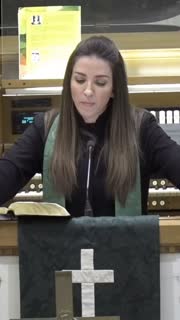Embracing Divine Compassion: The Heart of the Incarnation
Devotional
Sermon Summary
Bible Study Guide
Sermon Clips
### Quotes for Outreach
1. "If you were to ask people what they think of God, you'd generally get a mixed bag of responses, though they'd almost always lean negative. You'd hear things like this. God is looking down on us in judgment, eager to give us the punishment we deserve. God is angry. God is vengeful. God is absent. God is all-powerful but withholding. God is distant and uncaring. I don't really like God, or I have a problem with God, or I'm afraid of God. But now, if you were to ask people what they think of Jesus, you'd almost always get a positive response, even from non-Christians. People love Jesus. Jesus is good. Jesus is kind. Jesus is full of grace." [35:08] (56 seconds)
2. "The good news of the Incarnation, then, for those of us who believe in it, Brian said, is that we come to find out that God is like Jesus. If we believe that God became flesh in the person of Jesus Christ, then what we think of Jesus is what we can think of God. All the trouble and angst we carry about the nature of God, can be dispelled because God showed us what God is like when God became flesh in the person of Jesus Christ. That is the good news of the Incarnation, that God is like Jesus." [36:39] (40 seconds)
3. "Jesus did great big grand things, but what I love about our scripture today is the simple knowledge that even between his big blockbuster moments, he was guided by his compassion. On an ordinary day, when he was trying to get away for a while to just find some rest, even then, he never denied a person in need, and that says something about Jesus, doesn't it? And you know what? It says something about God, too, because God is like Jesus, right?" [40:38] (34 seconds)
4. "We each have power in our own sphere of influence. We can spread panic, disdain, dread, and despair, or we can spread courage, determination, love, and compassion. It makes sense why any one of us would want to give up on the hope of the world, but as Valerie Core says, courage is not a calculation of the mind, it is a choice of the heart. So my encouragement to all of you this morning is to double down on your compassion, on your commitments to each other, and on a vision in which all the hate and oppression that we see now become relics of history." [47:06] (39 seconds)
5. "As you go from this place, may you remember the good news of the Incarnation, that God is like Jesus, abounding in love, kindness, and compassion. May you go and be the same. Alleluia. Amen." [47:56] (19 seconds)
### Quotes for Members
1. "Our scripture, this morning, is dominated by human need. It seems that everywhere Jesus goes, he is always met with the sick, the lame, and the chronically incurable. What's interesting about our scripture, though, is that these verses from the Gospel of Mark, which text read for us, verses 30 to 34, and verses 53 to 56, are really not nearly as exciting as the 19 verses that fall in between them." [37:17] (32 seconds)
2. "Surely, there were simpler days. Days where his disciples came to share with him their journeys, and he encouraged them to share a meal and get some rest. Days where he submitted to gravity and traveled across the water by boat like all the rest of us. Days where he didn't raise the dead to life, but he looked out at crowds, and he had compassion on them." [39:10] (24 seconds)
3. "A God who issues commandments, becomes angry when disobeyed, and appoints representatives to be his prosecuting attorneys, judge, jury, and punisher. Every religion, our own included, has its fringe, although it's becoming much more mainstream in Christianity, that not only ignores the central notion of a compassionate God, but preaches an exclusivist doctrine that cannot tolerate anything outside itself and somehow manages to twist and transform compassion into hatred." [41:17] (37 seconds)
4. "No one would think to establish a faith built on a God who would die before he'd kill his enemies, a God who would humble himself to wash the feet of his own disciples, a God who would align himself not with the victorious and powerful, but the meek and the marginalized, a God who would look out at a crowd of suffering people and have compassion on them. No, if left to our own devices, we would have invented a Messiah that was more like a war hero, a military figure who, yeah, could maybe walk on water and work some incredible magic, but would never lower himself to the point of death, and certainly not death on a cross." [44:14] (40 seconds)
5. "I know a lot of people are sad, grieved, and afraid about the state of our democracy and where we're headed, and that's okay. That's normal, and we should feel all these things. I feel them too, and it's a sign of our humanity that our humanity is not too far gone. But please, my friends, in your grief, do not choose despair. As you lie awake at night wondering what happens next, remember that we are a part of what happens next." [47:06] (32 seconds)
Ask a question about this sermon
1. "If you were to ask people what they think of God, you'd generally get a mixed bag of responses, though they'd almost always lean negative. You'd hear things like this. God is looking down on us in judgment, eager to give us the punishment we deserve. God is angry. God is vengeful. God is absent. God is all-powerful but withholding. God is distant and uncaring. I don't really like God, or I have a problem with God, or I'm afraid of God. But now, if you were to ask people what they think of Jesus, you'd almost always get a positive response, even from non-Christians. People love Jesus. Jesus is good. Jesus is kind. Jesus is full of grace." [35:08] (56 seconds)
2. "The good news of the Incarnation, then, for those of us who believe in it, Brian said, is that we come to find out that God is like Jesus. If we believe that God became flesh in the person of Jesus Christ, then what we think of Jesus is what we can think of God. All the trouble and angst we carry about the nature of God, can be dispelled because God showed us what God is like when God became flesh in the person of Jesus Christ. That is the good news of the Incarnation, that God is like Jesus." [36:39] (40 seconds)
3. "Jesus did great big grand things, but what I love about our scripture today is the simple knowledge that even between his big blockbuster moments, he was guided by his compassion. On an ordinary day, when he was trying to get away for a while to just find some rest, even then, he never denied a person in need, and that says something about Jesus, doesn't it? And you know what? It says something about God, too, because God is like Jesus, right?" [40:38] (34 seconds)
4. "We each have power in our own sphere of influence. We can spread panic, disdain, dread, and despair, or we can spread courage, determination, love, and compassion. It makes sense why any one of us would want to give up on the hope of the world, but as Valerie Core says, courage is not a calculation of the mind, it is a choice of the heart. So my encouragement to all of you this morning is to double down on your compassion, on your commitments to each other, and on a vision in which all the hate and oppression that we see now become relics of history." [47:06] (39 seconds)
5. "As you go from this place, may you remember the good news of the Incarnation, that God is like Jesus, abounding in love, kindness, and compassion. May you go and be the same. Alleluia. Amen." [47:56] (19 seconds)
### Quotes for Members
1. "Our scripture, this morning, is dominated by human need. It seems that everywhere Jesus goes, he is always met with the sick, the lame, and the chronically incurable. What's interesting about our scripture, though, is that these verses from the Gospel of Mark, which text read for us, verses 30 to 34, and verses 53 to 56, are really not nearly as exciting as the 19 verses that fall in between them." [37:17] (32 seconds)
2. "Surely, there were simpler days. Days where his disciples came to share with him their journeys, and he encouraged them to share a meal and get some rest. Days where he submitted to gravity and traveled across the water by boat like all the rest of us. Days where he didn't raise the dead to life, but he looked out at crowds, and he had compassion on them." [39:10] (24 seconds)
3. "A God who issues commandments, becomes angry when disobeyed, and appoints representatives to be his prosecuting attorneys, judge, jury, and punisher. Every religion, our own included, has its fringe, although it's becoming much more mainstream in Christianity, that not only ignores the central notion of a compassionate God, but preaches an exclusivist doctrine that cannot tolerate anything outside itself and somehow manages to twist and transform compassion into hatred." [41:17] (37 seconds)
4. "No one would think to establish a faith built on a God who would die before he'd kill his enemies, a God who would humble himself to wash the feet of his own disciples, a God who would align himself not with the victorious and powerful, but the meek and the marginalized, a God who would look out at a crowd of suffering people and have compassion on them. No, if left to our own devices, we would have invented a Messiah that was more like a war hero, a military figure who, yeah, could maybe walk on water and work some incredible magic, but would never lower himself to the point of death, and certainly not death on a cross." [44:14] (40 seconds)
5. "I know a lot of people are sad, grieved, and afraid about the state of our democracy and where we're headed, and that's okay. That's normal, and we should feel all these things. I feel them too, and it's a sign of our humanity that our humanity is not too far gone. But please, my friends, in your grief, do not choose despair. As you lie awake at night wondering what happens next, remember that we are a part of what happens next." [47:06] (32 seconds)










